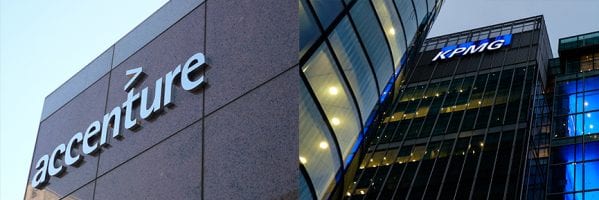Where Should I Work: JP Morgan Chase or Citibank?

Citigroup and JP Morgan Chase (JPMC), both headquartered in New York City, sit side by side on the list of the Big Four banks in the U.S. Each provide investment banking and other financial services to a wide variety of institutions, governments, private investors, and corporations.
Applicants with MBAs are obviously in high demand at both companies, and competition is fierce for positions at either one. Here we’ll compare the two and hopefully lend some insight into which one is the best fit to your career goals.
Internships
JP Morgan Chase offers internships for both early year undergrads and for postgraduate students. The undergraduate Early Insight program has a variety of positions posted, and applicants can consult the site for opening dates. These are typically short term and take place in JP Morgan’s worldwide offices as well as online.
For graduate and later year undergrad students, Internships at JPMC are usually 10-12 weeks long, with longer terms available in certain regions and business divisions.
Citigroup offers internships for undergrad and graduate students at the analyst level. Associate level internships are available to MBAs and other Master’s students on a full-time or summer basis. Opportunities in the U.S. and at the firm’s global offices are all searchable and available for application online.
Interviews
According to figures posted on Indeed, both firms have a process that takes around two weeks from scheduling to notification of your next interview. One interviewee for an Associate position at JPMC advised to “be confident and give qualitative and quantitative details regarding previous experiences”. Another candidate recommends inquiring about your potential team’s goals, and initiating a conversation about how exactly you will fit into this scenario.
Interviewees at Citigroup also report an overall positive experience, with phone appointments lasting about fifteen to thirty minutes. At the end of the call, the interview team will notify you as to whether you’ll advance. A current employee in the Operations department said of their interview that it was “open and loose and to the point. Professional questions like a checklist.” Another hire in Investments Accounting said, “I was interviewed and got an offer a month later.”
Compensation
The most recent published data from Paysa states that Citigroup pays an average salary of $96,700, ranging from $63,000 in the 25th percentile to $118,000 in the 75th. Specific positions pay as follows:
- Investment Banking Analysts – $70,000 on average with a range of $60-79,000
- Financial Analysts – $84,000 on average; a range of $75-$91,000
- Credit Analysts – $62,000 on average; a range of $52 – $71,000
- Risk Analysts – $90,000 on average; a range of $78 – $100,000
- Technical Analysts -$93,000 on average; a range of $82 – $102,000
As for JP Morgan Chase, the average salary is $84,524, ranging from $52,146 at the 25th percentile to $104,814 at the 75th percentile. A breakdown by position is as follows:
- Private Client Banker – $67,000 on average; a range of $57 -$76,000
- Underwriter – $58,000 on average; a range of $53 – $63,000
- Financial Advisor – $65,000 on average; a range of $55-$73,000
- Technical Analyst – $75,000 on average; a range of $65-$84,000
- Business Analyst – $92,000 on average; a range of $82 – $103,000
- Senior Business Analyst – $118,000 on average; a range of $104 – $130,000

Culture
JPMC employees have described the culture there as “fast paced and stressful” which should come as no surprise to anyone familiar with the investment banking world. Another worker said, “always be on task, time management is key but you must know how to manage your time before [getting hired]… it is not something that can be taught nor is it the responsibility of management.” Hours were generally reported as average for the industry, sometimes 40 per week but often more. Dress code is business casual/corporate casual according to the majority of employee reviews.
Again, no surprises with Citigroup when one employee said, “[it’s a] competitive environment in a highly competitive market. Management focused on profit, client service and emphasized adherence to compliance parameters.” Another Citi employee rated it a 5/5, saying, “The environment if fun and professional at the same time. The managers are organized and passionate about what they do.” Other workers cited increased stress at year-end, and yet another mentioned that their office was “in a constant state of change”.
Most reviewers said that hours were 40-45 per week on average with an increase during busier quarters. As for dress code, Citi is also business/corporate casual, and employees can earn a ‘jeans badge’ by donating money to charity.

Career Development
Citi offers promotions after 6 months, and raises once a year. Bonus structure here is strong and reliable, and any pay increase is based upon a ratings system.
JPMC’s promotion system is less well documented by employees, and one said, “pay raises are guaranteed. However, the amount is unknown.”
Both companies provide an impressive benefits package including healthcare and wellness coverage, retirement plans, and family leave, among others.
Recruiting
JPMC recently updated their university recruiting schedule; details on the changes can be found here. Citi also offers a robust recruiting program globally, with events updated here.
Top MBA Recruiters: Goldman Sachs

As one of the largest lending, securities, and investment management firms in the world, Goldman Sachs (GS) sits in the top tier of the Fortune 500. The global firm, headquartered in New York City, was founded in 1869 by Marcus Goldman. Samuel Sachs, Goldman’s son-in-law, joined the firm in 1882. Over the next decade, GS evolved into a provider of commercial paper for those starting businesses, and in 1896 it entered the New York Stock Exchange.
Continue reading…Where Should I Work: Accenture or KPMG

Accenture and KPMG are two of the world’s leading professional service providers. Accenture is the world’s largest independent technology services provider, while KPMG is one of the top providers in consulting and accounting. Both offer an array of career trajectories with global reaches and venerable reputations, perfect for business school graduates. Deciding between the two, however, is another issue.
Continue reading…Top MBA Recruiters: German Auto Manufacturers

The German auto industry is a world leader, with more than 830,000 employees worldwide. It’s an impressive global industry, which is just one reason why it’s attractive for MBA graduates. If you’re interested in manufacturing, these large care makers are a great choice.
Continue reading…Why Business School Grads Should Consider HubSpot

Massachusetts-based tech development company HubSpot builds tools and software for marketing and sales teams to help make their lives a little more organized and easier. It’s not only a godsend for its customers but also for its employees. Glassdoor dubbed HubSpot the “Best Place to Work in 2020.” For the last 12 years, Glassdoor ranks the top 100 companies by user data, such as a company’s culture and workplace ratings. So, actually, that means employees choose the winner.
Continue reading…Top Paying Business School Careers: Hospitality & Travel

Pursuing an MBA concentration in hospitality and travel can lead you down an exciting career path in a popular industry. In the United States, travel and tourism accounts for roughly $1.1 trillion in annual GDP and over five million jobs.
Continue reading…